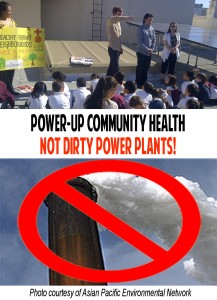CEJA urges CA Public Utilities Commission to Say No to Natural Gas, Commit to Clean Energy
 The closure of the San Onofre Nuclear Generating Station (SONGS) is a huge opportunity for California to continue expanding our clean energy resources. The California Public Utilities Commission (CPUC) recently released a proposed decision (“Draft Plan”) on how to meet Southern California’s energy needs now that SONGS has closed. The Draft Plan leaves the door open for utilities to build up to 800 megawatts of dirty natural gas power plants. However, it also gives utilities the option to use the many clean energy and energy efficiency programs available, if they choose. Utilities should not be given the opportunity to build more power dirty power plants when clean energy can meet Southern California’s energy needs.
The closure of the San Onofre Nuclear Generating Station (SONGS) is a huge opportunity for California to continue expanding our clean energy resources. The California Public Utilities Commission (CPUC) recently released a proposed decision (“Draft Plan”) on how to meet Southern California’s energy needs now that SONGS has closed. The Draft Plan leaves the door open for utilities to build up to 800 megawatts of dirty natural gas power plants. However, it also gives utilities the option to use the many clean energy and energy efficiency programs available, if they choose. Utilities should not be given the opportunity to build more power dirty power plants when clean energy can meet Southern California’s energy needs.
CEJA calls on the Commission to make a commitment to clean energy and environmental justice in California by amending the Draft Plan as follows:
- Don’t give the utilities the choice to build new natural gas power plants instead of clean energy: The Draft Plan allows San Diego Gas & Electric (SDG&E) and Southern California Edison (SCE) to build new gas plants—up to 500MW and 300MW, respectively— to meet grossly over-estimated future needs. At a time when California’s clean energy resources, energy storage and energy efficiency programs are all booming, it would be an unnecessary step backwards to allow new natural gas power plants. Gas plants harm public health, emit greenhouse gases, and can cost billions of dollars. Any need for new energy generation should be met with our already-available clean energy and storage resources.
- Clarify that clean energy and energy efficiency programs can meet Southern California’s energy needs. Southern California does not need more dirty power plants. The Draft Plan overestimates the long-term energy need by excluding thousands of megawatts of new clean energy, energy efficiency, demand response and energy storage resources that are available and coming online. When the energy need estimates include all of the available data, it is clear that renewable programs can meet Southern California’s energy needs.
Ensuring a clean, efficient energy system is not just about sustainability, it is an issue of environmental justice. Polluting power plants disproportionately impact low-income communities of color. California’s utilities have a well-documented history of putting polluting power plants and big transmission lines through low-income communities of color, which contribute to poor air quality and health issues. Power plants contribute to climate change, which impacts low-income communities of color first and worst.
The Commission can act now to reduce climate impacts, strengthen our state’s clean energy infrastructure, and promote social equity. Allowing new dirty and unnecessary natural gas power plants would send California down the wrong path. The Commission must take a strong stand to make our future brighter and ensure communities of color do not continue to bear the burden of dirty power plants in California.

